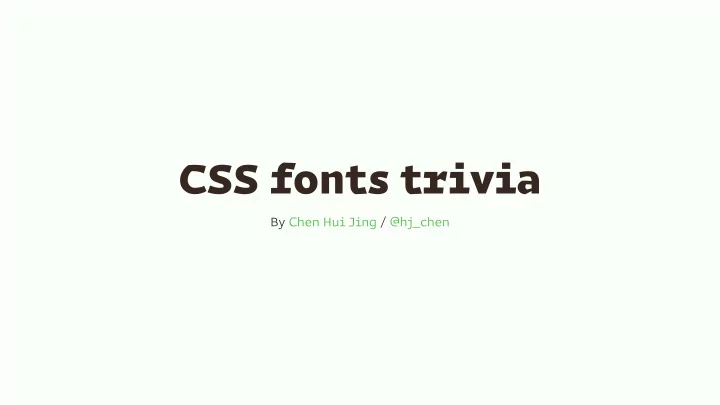

CSS fonts trivia By Chen Hui Jing / @hj_chen
Font formats for web use WOFF2 (Web Open Font Format 2)
Declare your Latin fonts first font-family: 'Gentium Basic', 'PingFang TC', 'Microsoft JhengHei', ' 微軟正⿊體 ', 'Heiti TC', ' ⿊體 - 繁 ', sans-serif; Font rendering for Mac and Windows is different, and sometimes the Latin characters in Chinese fonts don't look good on Windows. Put your font names in quotes. Just in case.
Generic font families Dependent on OS, HTML language, character set and browser. serif Times New Roman, SimSun, SongTi SC sans-serif Arial, Microsoft Yahei, PingFang SC monospace Consolas, SimSun, PingFang SC cursive Comic Sans MS, Apple Chancery, SimSun (oblique), SongTi SC (oblique) fantasy Gabriola, Impact, Papyrus, Microsoft Yahei, PingFang SC Level 4 is adding system-ui , emoji , math and fangsong
Basic font properties Specifies the weight of the glyphs in the font. Can use keywords or font- numerical values. weight Selects a normal, condensed or expanded face from a font family. Range font- spans over 9 keywords. stretch Allows italic or oblique faces to be selected. font-style Indicates the desired height of the glyphs. Takes absolute or relative font-size values. font-size- Adjusts the font-size to preserve the x-height of the first choice font. adjust Controls whether user agents are allowed to synthesize bold or oblique font- font faces when missing. synthesis
Using non-system fonts The @font-face rule allows us to link to fonts, either locally or external, which are fetched and activated when needed. We can use multiple @font-face rules to construct font families. A rule consists of the @font-face keyword followed by a block of font descriptors.
Anatomy of an @font-face rule @font-face { font-family: <family-name> src: [ <url> [format(<string> #)]? | <font-face-name> ] # font-style: normal | italic | oblique font-weight: normal | bold | 100 | 200 | 300 | 400 | 500 | 600 | 700 | 800 | 900 font-stretch: normal | ultra-condensed | extra-condensed | condensed | semi-condensed | semi-expanded unicode-range: <urange> # font-variant: normal | none | [ <common-lig-values> || <discretionary-lig-values> || <historical-lig-values> font-feature-settings: normal | <feature-tag-value> # }
Краткая история создания Тетриса Алексей Пажитнов написал первый Тетрис на компьютере Электроника -60. Он работал в ВЦ Академии наук , где изучал вопросы распознавания речи и искусственного интеллекта . Для обкатки своих идей Пажитном использовал головоломки , включая и пентамино . Он попытался сделать автоматической укладку в заданные фигуры пентамино , но не хватило мощности того оборудования для его вращения . Пришлось отлаживать на тетрамино , так и родилось название игры . Те опыты Алексея и родили главную идею Тетриса – падение фигурок и исчезновение заполненных рядов .
@font-face { font-family: 'Magnetic Pro'; src: url('magnetic-pro-light.woff2') format('woff2'), url('magnetic-pro-light.woff') format('woff'); font-weight: normal; font-style: normal; } @font-face { font-family: 'Magnetic Pro'; src: url('bender.woff2') format('woff2'), url('bender.woff') format('woff'); font-weight: normal; font-style: normal; unicode-range: U+0400-U+04FF; }
Font feature properties (1/2) font-kerning font-variant-position font-variant-position-ligatures No kerning Kerning applied font-variant-numeric font-variant-caps font-variant-alternates
Font feature properties (2/2) font-variant-east-asian font-language-override font-feature-settings Provides low-level control of advanced OpenType features
THE END http://www.chenhuijing.com @hj_chen @hj_chen @huijing
Recommend
More recommend